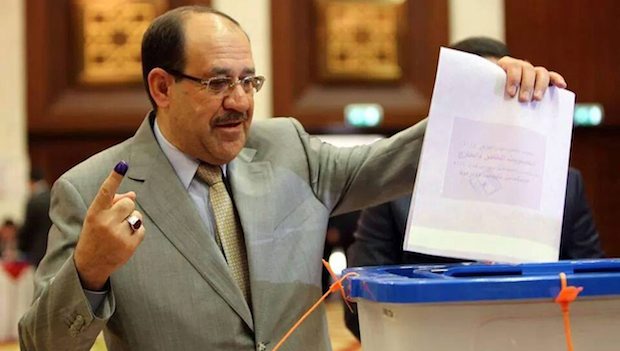
A handout picture released by the Prime Minister’s Office shows Prime Minister Nuri Al-Maliki casting his ballot during the Iraqi legislative election at a polling station in the green zone in Baghdad, Iraq, on April 30, 2014. (EPA/PRIME MINISTER OFFICE/HANDOUT)
Baghdad, Erbil and London, Asharq Al-Awsat—The UN Security Council called for the Iraqi leadership “to engage as quickly as possible, to form a government that represents the will and sovereignty of the Iraqi people,” after the polls closed in Wednesday’s legislative elections.
But there have been few signs of reconciliation between the Iraqi political parties that had engaged in fierce confrontation during the campaign.
Speaking at a polling station on Wednesday, Prime Minister Nuri Al-Maliki said he was certain his State of Law coalition would emerge victorious in the first elections to take place in the country since the withdrawal of US troops from the country.
“Our victory is certain; we are talking about how big that certain success will be,” he said from outside a polling station in Baghdad’s Green Zone.
The State of Law coalition is “ready to forge an alliance with any side providing they believe in the unity of Iraq and keep away from militias and sectarian violence,” Maliki told reporters after casting his ballot.
But outgoing Council of Representatives speaker Osama Al-Nujaifi, Maliki’s key rival, ruled out any alliance between his own Mutahidoun and the premier’s coalition, saying: “We have decided that joining an alliance with the prime minister is a red line for us.”
He also said that discussions about choosing a new president, who must be elected by a two-thirds majority in the Council of Representatives, have been “postponed.”
“Iraq has been going through a transition period for more than ten years, and we are now in need of stability in order to build the state in a proper manner based on the [political] components and commitment to the constitution.”
A senior figure in the Nujaifi-led Mutahidoun coalition, Essam Al-Obaidi, said in comments to Asharq Al-Awsat that Nujaifi’s statements can be taken as confirmation that the Sunni-led electoral bloc has no intentions of forging an alliance with Maliki.
The Mutahidoun bloc had strongly criticized Maliki’s record in office, particularly his security record.
Obaidi said that Maliki’s policies over the past eight years have been “wrong” and “pointless,” indicating that key political leaders—including former Maliki ally Moqtada Al-Sadr—had reached a broad settlement to prevent Maliki securing a third term in office.
“We all want to build a state, whereas Maliki has been working to build power and fragment the state,” Obaidi said.
But speaking to Asharq Al-Awsat on Wednesday, State of Law MP Ali Al-Shallah said his coalition “enjoys great popularity in the street,” adding that “Maliki is the most popular [leader] in Iraq.”
Asked about Nujaifi refusing to enter an alliance with the State of Law coalition, Shallah said the Mutahidoun bloc leader “will not get half as many seats he got in the previous elections, and thus is not in a position to set conditions.”
Two days after calling for a boycott of Wednesday’s vote, Iraq’s senior Sunni cleric, Abdul Malik Al-Saadi, on Wednesday issued a fatwa urging Sunnis to turn out to the polls en masse.
Meanwhile, more than 2.5 million Kurdish voters also headed to the polls on Wednesday to elect their representatives in the Iraqi parliament.
Prime Minister of Iraq’s semi-autonomous Kurdistan region Nechirvan Barzani said that the elections will “change the political map in Iraq,” predicting that the formation of the next government will be “difficult.”
He told Asharq Al-Awsat that “efforts to form a government in Kurdistan have faced major difficulties—but the efforts to form a federal government will be even more difficult,” referring to the ongoing political wrangling that has followed last September’s elections for the region’s parliament.
There were fears of election fraud across Iraq and particularly in the Kurdistan region. Soran Raber, a leading member of the Islamic Group in Kurdistan, told Asharq Al-Awsat that “many police and Peshmerga officers cast their votes twice, once during the special voting session for security officers and again in the general election, and many of them held two electronic voting cards.”
Police officers and members of the armed forces cast their ballots earlier in the week, to free them up to participate in the massive security operation deployed on Wednesday to prevent election-day violence.
“Freedom of movement between governorates in order to cast votes has led to many police and Peshmerga officers casting their votes twice in different governorates and with different names, in addition to the fact that names of dead people who were not removed from the electoral register, were used to vote,” Raber added.
Hamza Mustafa contributed reporting from Baghdad; Mohamed Zangeneh contributed reporting from Erbil
